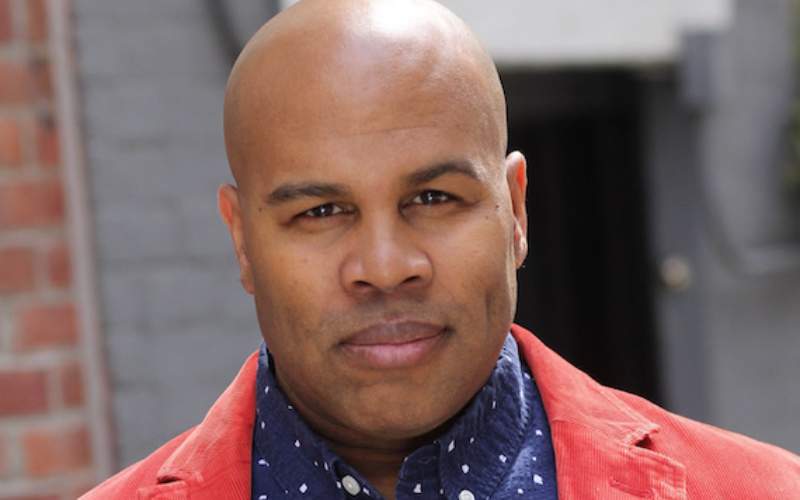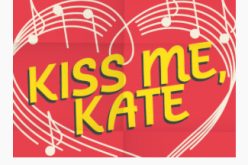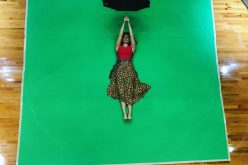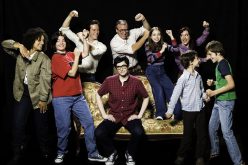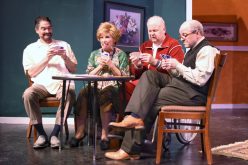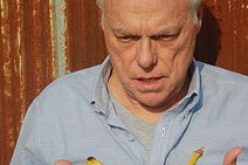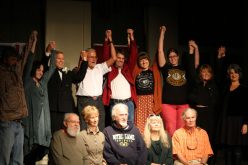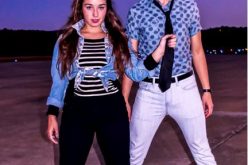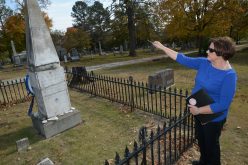Siblings, rivalry and race examined at UA
LARA JO HIGHTOWER
lhightower@nwadg.com

Photo courtesy UA Theatre
“It’s a really hard play — it’s not easy at all,” says “Topdog/Underdog” director Kevin Free. “I know even when it opens, I’ll still have new ideas for it.”
Kevin Free, guest director with the University of Arkansas department of theater, says Suzan-Lori Parks’ Pulitzer Prize-winning play “Topdog/Underdog” has long been one of his favorite plays.
“I’ve seen the off-Broadway and Broadway productions, and have even auditioned for it several times,” says the New York-based actor/director. “When [department chairman Michael Riha] offered me the job of directing, I was super excited. The copy of the play that I use to direct from is the copy of the play that I’ve had since it was published.”
When Parks’ play debuted in 2001, it made quite the splash: In addition to the Pulitzer, the show racked up a plethora of other awards including a Tony Award for Best Actor, an Obie Award and several Outer Critics Circle Awards. In his New York Times review, Ben Brantley said, “Like ‘Invisible Man’, Ralph Ellison’s landmark novel of 1952, ‘Topdog/Underdog’ considers nothing less than the existential traps of being African-American and male in the United States, the masks that wear the men as well as vice versa. But don’t think for a second that Ms. Parks is delivering a lecture or reciting a ponderous poem… ‘Topdog/Underdog’ is a deeply theatrical experience.”
Free says he found some personal connections in what the Pulitzer Prize Committee called a “dark comedy.” The play tells the story of two down-on-their luck siblings named Lincoln and Booth.
“I grew up with an older brother who was two years older, and a younger brother who was two years younger,” says Free. “My older brother and I had a kind of stormy relationship that was based on competition, and I remember thinking, as an adult, when we had worked through some of those issues — I don’t know why that happened. I don’t know why we were competitive. I look back and I think, there was never anything for us to be competitive about, other than we liked a lot of the same things, we went to the same school, we knew a lot of the same people. So that was one of the things that I connected to in the play, the idea that one brother was competing with the other and the other wants to be just like his brother — and then that relationship switches.”
Though the play was written 18 years ago, its themes — particularly systemic oppression, poverty, inequity — unfortunately remain evergreen. Those themes play out in dark ways.
“I really am attracted to tragedy,” says Free with a laugh. “This play sort of says that these two men are stuck in a world they didn’t choose, and as each one is trying to make the world make more sense to themselves, they fail. I really love the way these brothers love each other, and I love the way the brothers are adversarial with one another. I’m attracted to the tragedy of the story in general — the idea that, no matter what choices they make, they’re not going to get to where they want to get, or where they need to get.”
Though the play, as written, only calls for two actors, Free says he was interested in developing a new concept that would allow more UA students to participate in the production.
“The more I thought about it, I realized that I didn’t want to be a guest director coming in to work with two black students and a design and production team, without making sure that the whole department was involved,” he says. “This department is huge — 120 majors, 71 minors, and many of those students won’t get to see a stage. So we’re reclaiming the entire play, and we’re casting it as if it’s in a museum.”
Free says framing the process this way has made for an eye-opening learning experience for all involved.
“We have ended up discussing things that I didn’t expect to discuss when I came down here,” he says. “We had a whole rehearsal that was a discussion of critical race theory.
“It’s important that the learning that happens is positive and inspires a lot of growth for all of us.”
__
FAQ
‘Topdog/Underdog’
WHEN — 7:30 p.m. March 1-2 and 6-9; 2 p.m. March 3 and 10
WHERE — University of Arkansas Black Box Theater, 2 E. Center St., Fayetteville
COST — $5-$20
INFO — 575-4752

